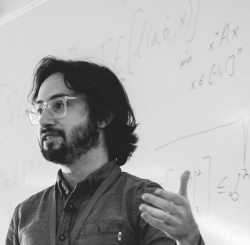Excited states of quantum systems are relevant for photochemistry, quantum dots, semiconductors and more, but remain extremely challenging to calculate by conventional computational methods. In recent years tools from machine learning have found useful application in computational quantum mechanics, especially in making ground state calculations much more accurate. In this talk I will present a new algorithm for estimating the lowest excited states of a quantum system which works extremely well with deep neural networks. The method has no free parameters and requires no explicit orthogonalization of the different states, instead transforming the problem of finding excited states of a given system into that of finding the ground state of an expanded system. Expected values of arbitrary observables can be calculated including off-diagonal expectations between different states such as the transition dipole moment. We show that by combining this method with the FermiNet and Psiformer Ansatze we can accurately recover vertical excitation energies and oscillator strengths on molecules as large as benzene. Beyond the examples on molecules presented here we expect this technique will be of great interest for applications to atomic, nuclear, and condensed matter physics.
Bio: David Pfau is a staff research scientist at Google DeepMind and a visiting professor at Imperial College London in the Department of Physics, where he supervises work on applications of deep learning to computational quantum mechanics. His research interests span artificial intelligence, machine learning and scientific computing.
Prior to joining DeepMind, he was a PhD student at the Center for Theoretical Neuroscience at Columbia, where I worked on algorithms for analyzing and understanding high-dimensional data from neural recordings with Liam Paninski and nonparametric Bayesian methods for predicting time series data with Frank Wood. He also had a stint as a research assistant in the group of Mike DeWeese at UC Berkeley, jointly between Physics and the Redwood Center for Theoretical Neuroscience. His current research interests include applications of machine learning to computational physics and connections between differential geometry and unsupervised learning.

